AFM NEWS
Forestry Road Construction and Maintenance

As landowners review their property’s assets, they may need to construct and maintain roads for logging or other forest management activities. This can seem like a daunting task, especially when one considers issues of accessibility, the permitting process, and prime road location to minimize environmental impacts and construction costs. At AFM, our foresters and land management professionals are well-versed in all aspects of road construction and maintenance. Read on to learn more about the process of constructing new roads, monitoring and maintaining roads in all seasons, and ecological considerations and protections.
When a client’s property has merchantable timber, new “logging” roads must be created to harvest timber from those lands. A logging road is usually constructed from parent gravel material extracted on the site, or gravel material is hauled in to fabricate a road base capable of supporting tractor-trailer loads of timber that can exceed 100k pounds. These roads also serve as gathering locations to skid wood to a roadside landing to sort and process forest products that will be hauled over public roadways to various locations. While this may seem overwhelming, AFM foresters can assist landowners in numerous ways, including:
- Ascertaining the road centerline location that optimizes accessibility and takes advantage of favorable operating conditions.
- Minimizing water crossings to reduce construction costs and environmental impacts. This may mean designing a bridge or culvert to cross streams and rivers.
- Preparing road construction estimates for clients to review and approve before any road construction begins.
- Obtaining any and all federal, state, or municipal permits on the landowner’s behalf. Common permits include public road entrance permits and water crossings for temporary or permanent structures, like culverts and bridges.
- Entering into road service contracts with local road building contractors who own construction equipment and employ operators needed to complete the project. Occasionally, landowners may recommend a contractor they would like to work with.
- Following Best Management Practices (BMPs) when applicable. In the northeast, BMPs are suggested practices to protect water quality for logging and road projects, but many other U.S. states have made BMPs legally binding. AFM incorporates these BMPs into our client road plans and our service contract specifications.
Having a local forester and land management professional helping landowners through the process mitigates the heartburn and frustration that some may feel when engaging in the permitting process and interacting with contractors, but AFM is prepared to handle the entire process. Maintenance is the next step after the road is constructed, and AFM takes responsibility for this in numerous ways.
The timing of a timber harvest significantly impacts the level of maintenance needed. In the northeast, winter operations allow the road surface to freeze, and minimal road surface material is added. On the other hand, summer roads tend to be drier but still require ditching, spot graveling, and cross-drain culvert installation to address water flow following wet weather events. Typically, spring and fall roads present the most challenges for large logging equipment and trucks as the roads tend to become saturated from frequent rainfall and a dormant growing season. When trees and vegetation are dormant, they no longer absorb water, thus speeding up road saturation. Gravel surfacing of the road base is essential during this time. Additional road maintenance projects can include road grading, removal of roadside brush mechanically or chemically, dust control, snow plowing, cleaning or replacing failed culverts, reditching road sections, hauling additional gravel to improve road surfaces, nuisance beaver control, and redecking bridge surfaces. AFM monitors road conditions before, during, and after all projects, and we conduct weekly inspections during the construction period. Our clients can rest assured that we will check on roads to assess damage after storms and make plans with the landowner to repair it.
One final consideration that landowners may have is protecting species, ecosystems, and natural resources during the road construction process. All AFM foresters are natural resources professionals who are thoroughly trained and adhere to all documentation regarding threatened and endangered species restrictions or recommendations provided by state and federal agencies. Critical habitats and imperiled ecosystems are also taken into account; if these conditions are found on a client property, AFM foresters will alter designs, locations, or timing of road construction or timber harvest to accommodate and safeguard these habitats. AFM is committed to protecting biodiversity and ensuring habitat protection for creatures large and small, as each plays a vital role in environmental health and well-being.
Road construction and maintenance are often the largest expenses landowners face every year. AFM foresters can help construct and monitor road expenses to ensure outcomes are met within clients' specific budgets. Our foresters and land management professionals can assist landowners throughout the entire process, from troubleshooting accessibility issues and weather events to protecting ecosystems for various species. Landowners can confidently trust their AFM land manager to construct roads on small properties and large access roads that access tens of thousands of acres of timberland. While the scale and cost may vary, our unparalleled customer service and expertise are steadfast. Contact us today for information or a free consultation.
